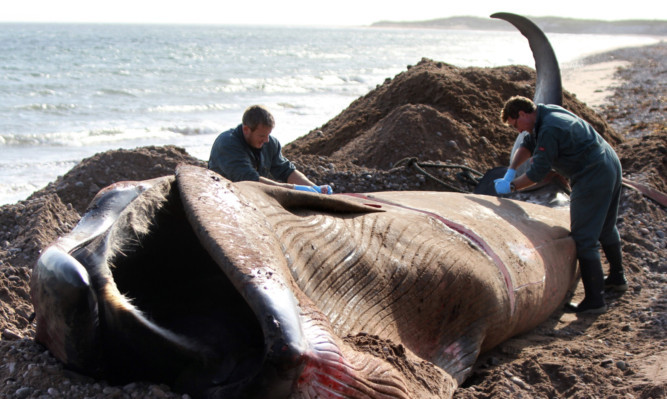An intestinal infection led to the death of a 40ft whale washed up on an Angus beach last year.
Marine experts confirmed the sei whale discovered on the foreshore near Arbroath Golf Club in September had succumbed to parasitic gastroenteritis, which probably left it unable to feed properly and led to the animal’s slow deterioration in the water.
The baleen was the subject of an on-site post-mortem by a team from the Inverness-based Scottish Marine Animal Strandings Scheme (SMASS), following its discovery by a dog walker on the beach at Elliot.
Many people turned out to watch the day-long autopsy as experts took a wide range of samples from the body of the mammal, before it was buried in situ.
The sei whale is the world’s third-largest rorqual and can reach almost 65ft in length and weigh as much as 28 tonnes.
The Angus discovery followed the stranding of a pod of pilot whales on Fife’s East Neuk, with theories over the cause of the incidents including the possible impact of sonar seismic activity associated with oil, gas or windfarm surveys.
However, early examination of the Angus mammal revealed the whale to be thinner than expected and detailed analysis has unearthed the cause of its condition.
SMASS coordinator Barry McGovern told The Courier: “The histopathology results confirmed parasitic gastroenteritis.
“We thought they would, as when we opened the intestines they were covered in small parasites the whole way through. This parasite burden would have led to a debilitated state and ultimately, led to its live stranding.”
Mr McGovern added: “We see so few of these strandings that we cannot say if a death from this type of parasite is a common cause.
“A lot of animals we examine have parasites within them and some can function with a certain level present but eventually, it takes too much of a hold.
“This would have affected its nutrient uptake. Sei whales migrate through tropical waters and this would have come back here for feeding but would have been unable to do that because of the parasite burden.”
The Arbroath whale had been spotted some days earlier in the waters off Fife, when it was likely to have been nearing death.
“If it wasn’t able to feed and was not as strong as it could be, things like the current could easily influence it and in a weakened state, it could have easily come to shallow waters before being stranded,” added Mr McGovern.
